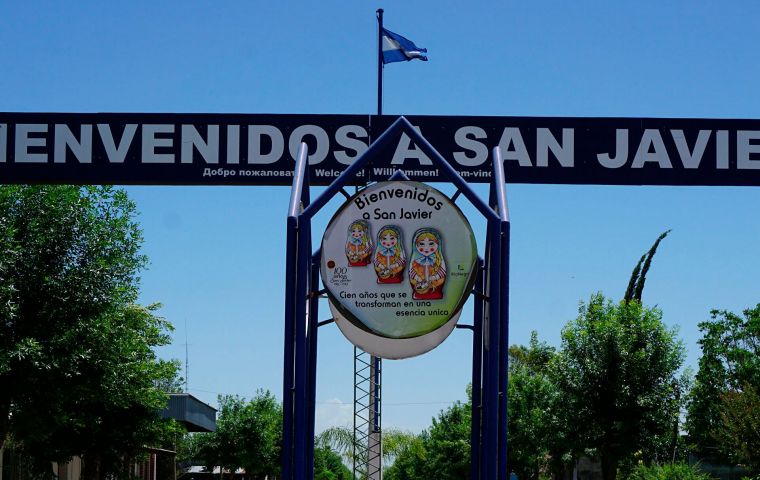MercoPress. South Atlantic News Agency
Uruguayan town founded by Russian settlers emotionally hit by war
 San Javier's corned beef once fed Soviets fighting Nazi Germans
San Javier's corned beef once fed Soviets fighting Nazi Germans Residents in the Uruguayan town of San Javier are not like any other South American people. At least not when Russia is involved in what seems to be the largest armed conflict so far in the 21st Century. San Javier was founded by Russian immigrants in the early 1900s. For locals, Russia is still their Mother Land.
Although few people currently speak Russian or even carry Russian names, the Uruguayans of San Javier are proud of their heritage and boast their assistance to Soviet troops fighting Nazi Germany's onslaught against Stalingrad. San Javier fed Russians throughout that plight. But this time around they firmly denounce the invasion of Ukraine.
San Javier has several Cyrillic inscriptions on display, a “Maximo Gorki” cultural center, and five giant matryoshka dolls on the central square. It all points to a history that is “unique in Uruguay and South America,” says Leonardo Martinez, the deputy mayor of the village of 1,800 people. The mayor's office claims a “high percentage” of the current inhabitants descend from Russian settlers, although over time the village has seen a blending of people and cultures, like the country as a whole.
In 1913, 300 families, originally from Russia's western Voronezh region and followers of the “New Israel” Christian sect that was persecuted by Tsarist Russia, arrived in Montevideo. A few months later, around 600 people settled in San Javier, on the Uruguay River shore. It was the largest autonomous Russian agricultural colony in South America and quickly became a roaring success.
“Looking at photos we feel a bit nostalgic... for the great sacrifice they made,” said Martinez, 43, the great-grandson of an original settler.
The village has its own museum, a tourist site for its Russian history. But despite those ties, not a single flag or banner proclaiming partisanship can be found in its streets. “I've not seen explicit support in San Javier” for either country, said Martinez about the war between Russia and Ukraine more than 10,000 kilometers (6,200 miles) away. “We're against the war, that's obvious,” he said. “Against all armed conflicts.”
Leonardo Lorduguin, a 22-year-old San Javier resident, has set up a Facebook page dedicated to his village. He is fascinated by the Russian language, which he has been learning for two years -- one of the few of his generation to speak it. But he would not commit to either side in the current conflict. He insists that the first settlers came from “Great Russia.”
“In 1913, only Russians came but some had Ukrainian names. They came to Montevideo and were told there was a Russian colony in San Javier,” said Lorduguin, reeling off the Russian and Ukrainian surnames of some villagers.
Alejandro Sabelin, 80, is one of the few villagers to speak Russian in addition to Spanish. His father was born in San Javier three months after his grandparents arrived there. He recognizes that the language is being lost in the community. His own children understand Russian better than they speak it. “I'm really sorry about what is happening because it is almost like killing your brothers,” he said of Russia's invasion of its neighbor.
Although he has never visited the homeland of his grandparents, Sabelin says, “I will never stop supporting Russia.” But “the war is awful, what's happening is horrible,” he adds (Source: AFP)




Top Comments
Disclaimer & comment rulesCommenting for this story is now closed.
If you have a Facebook account, become a fan and comment on our Facebook Page!